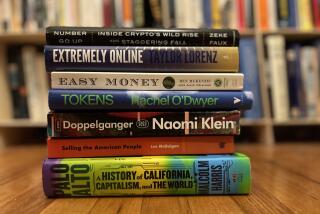‘Bold’ offers entrepreneurs a chutzpah-filled guide for thinking big

- Share via
Peter Diamandis is a self-appointed high priest of digital disruption.
And not just any form of digital disruption: He goes in for the exponential kind, which holds that the accelerating pace of technological progress is throwing up undreamed-of opportunities.
In short, there is no industry invulnerable to attack from the proverbial entrepreneurs in garages — including space exploration, his personal passion.
In a tech boom, predictions like these can easily turn to hype.
Diamandis, with his relentless exhortations for start-ups to think much bigger (his latest venture plans to mine asteroids), certainly is not the kind to allow self-doubt to creep in.
But it is worth suspending disbelief long enough to consider the implications of the world he describes in a new book, “Bold: How to Go Big, Create Wealth and Impact the World.”
After all, the Mountain View, Calif., mobile messaging firm WhatsApp Inc., with only 55 employees, really is closing in on 1 billion users and sold itself to Facebook for $21.8 billion. Could you harness the forces that made this possible — or, at least, spot the threat to your industry?
“Bold,” published by Simon & Schuster, is a three-step introduction: part vision, part motivational sermon, part how-to manual.
The vision part is familiar from “Abundance,” an earlier book that, like “Bold,” was written by Diamandis and Steven Kotler. In short: The collapse in the cost of sensors and computing power, ushering in new technologies such as robotics and artificial intelligence, has created a playground for entrepreneurs.
Diamandis has an eye for spotting when these things will have mainstream business impact: It is when their user interfaces become simple enough to get adopted widely and experimentation leads to breakthrough applications.
The middle section gives the book its title and its core. In the world that is now emerging, says Diamandis, failure is more likely to result from thinking too small than too big. To succeed, entrepreneurs need an “aptitude upgrade.”
Think of it as pure chutzpah, an area in which Diamandis excels.
His many hats testify to the power of always pushing the big idea, including entrepreneur, motivational speaker, founder of the X-Prize contests and co-founder of Singularity University, where executives get a taste of exponential entrepreneurship.
An example of Diamandis’ advice: Aim for what he calls “super-credibility.” If you have an idea that stretches normal credibility, then there is a danger no one will believe you can achieve it.
His response: Raise your sights even higher and shoot for the moon. At that point, people become so excited they clamor to get involved, making it reality.
The book ends with practical advice on how to build a company on a shoestring, including using competitions to get other people to contribute breakthrough ideas.
More than 10 years ago, the first X-Prize was awarded to a privately funded rocket that seemed set to make space tourism a reality.
But Virgin Galactic, the company that went on to try to commercialize the technology, is years behind schedule and its latest test vehicle disintegrated high over the Mojave Desert three months ago, killing one of the pilots.
Thinking big has its virtues but boldness alone does not get the job done.
Waters is the West Coast editor of the Financial Times of London, in which this review first appeared.
More to Read
Inside the business of entertainment
The Wide Shot brings you news, analysis and insights on everything from streaming wars to production — and what it all means for the future.
You may occasionally receive promotional content from the Los Angeles Times.










